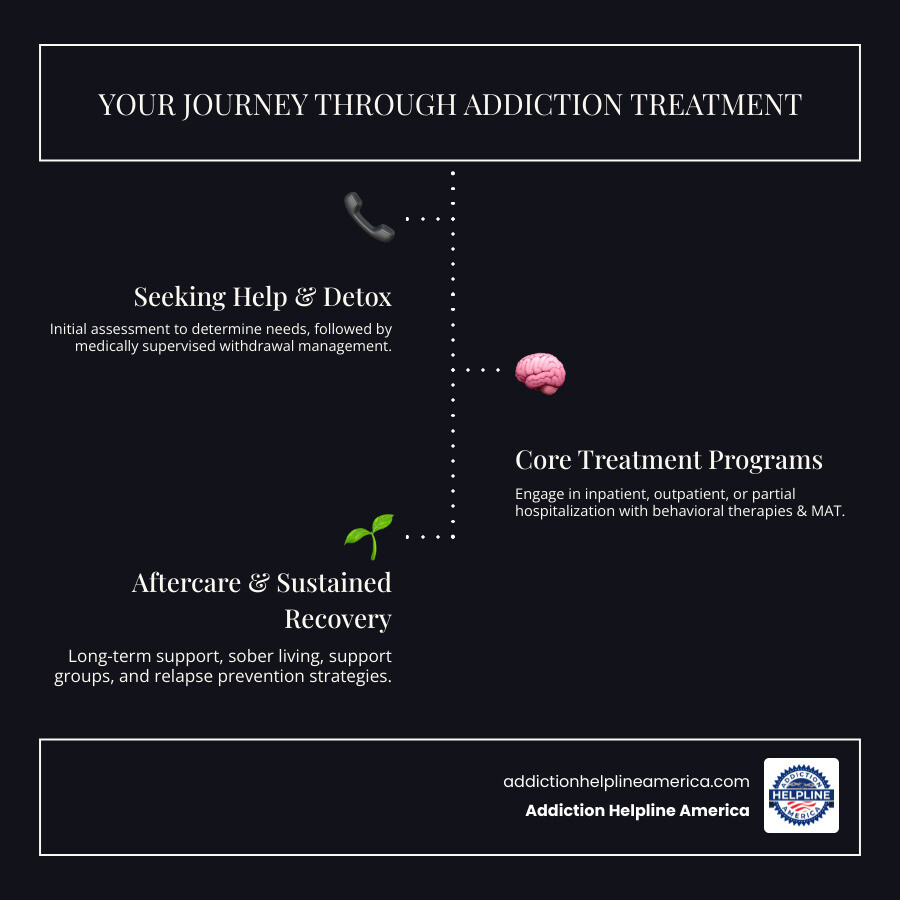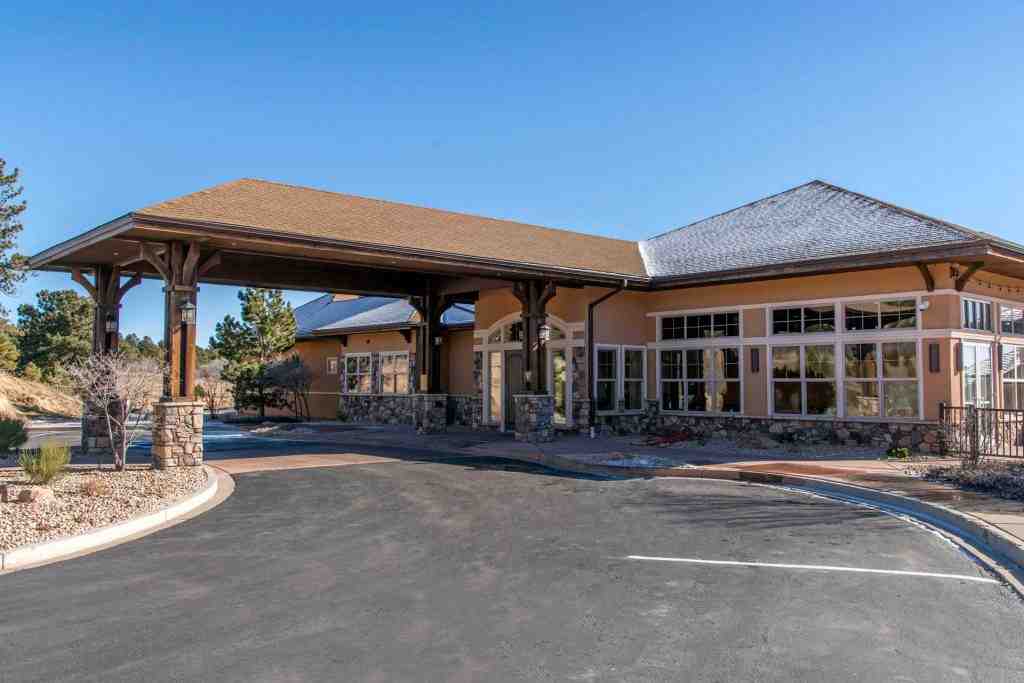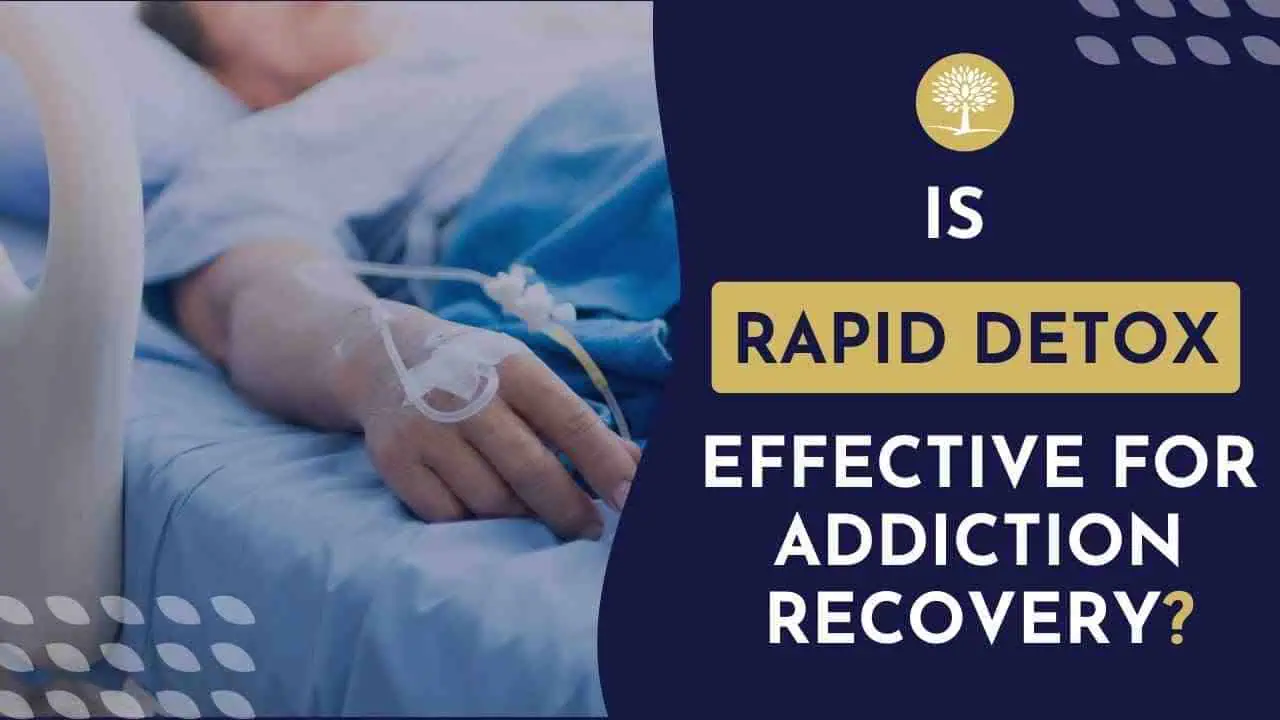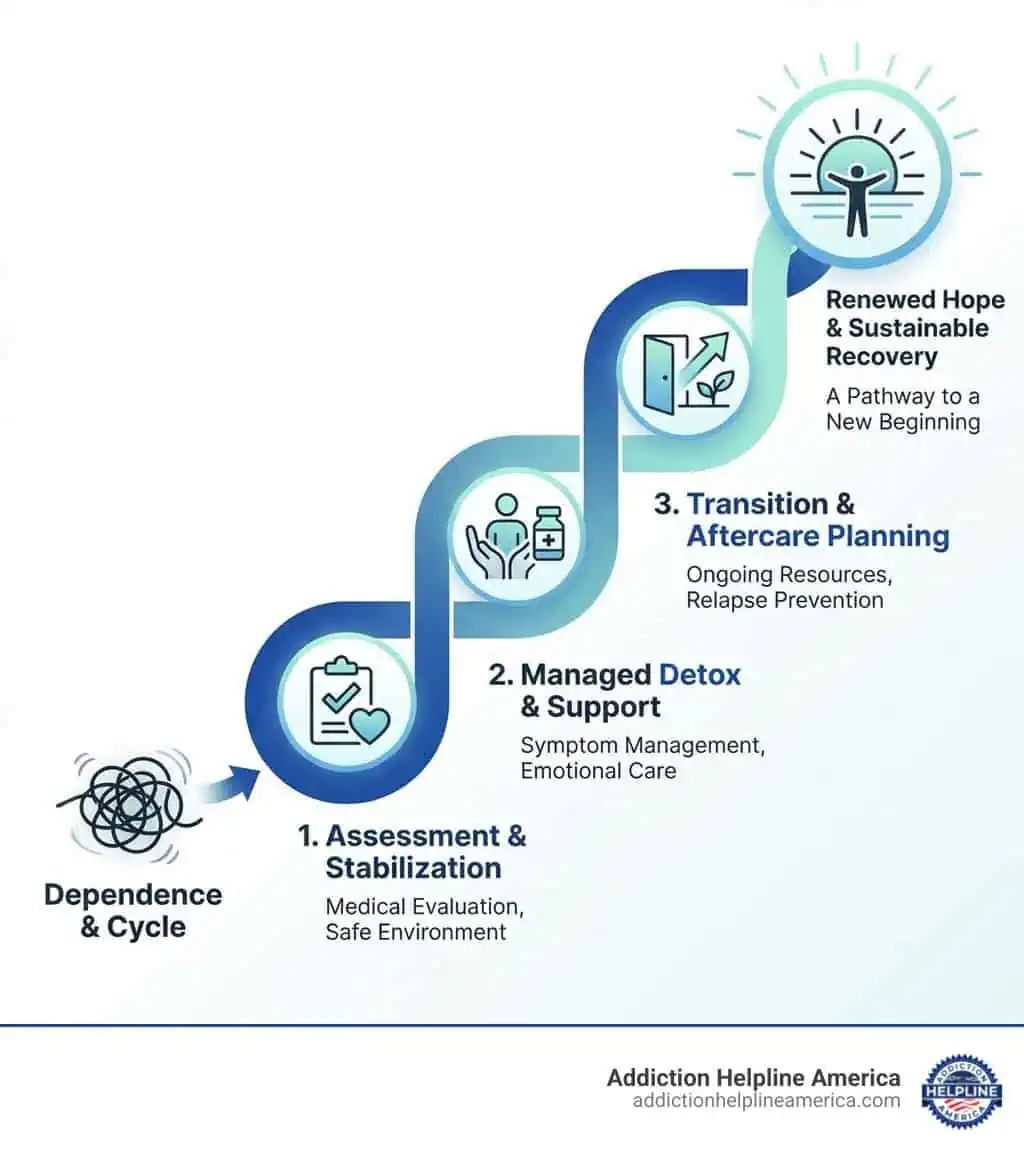
Why Understanding Addiction Treatment Programs Matters
Addiction treatment programs are specialized services designed to help individuals overcome substance use disorders. If you’re searching for help, here’s what you need to know about the main types of treatment:
- Inpatient/Residential Treatment: 24/7 care in a structured, supervised facility.
- Outpatient Treatment: Flexible care (IOP, PHP) while living at home.
- Medication-Assisted Treatment (MAT): Medications combined with therapy for opioid, alcohol, or nicotine addiction.
- Detox Programs: Medically supervised withdrawal management to start recovery safely.
- Aftercare Services: Ongoing support like sober living and support groups.
The good news is that addiction is a treatable disorder. Like other chronic diseases such as heart disease or asthma, addiction is managed rather than cured. Treatment helps people counteract addiction’s disruptive effects and regain control. A relapse doesn’t mean treatment has failed; it indicates that treatment should be resumed or adjusted.
Effective programs address the whole person, considering their medical, mental, social, and occupational needs. The best approaches combine behavioral therapies with medications when appropriate.
At Addiction Helpline America, we help individuals and families find the right treatment options. We provide compassionate, confidential guidance to connect you with resources for your recovery journey.

Quick addiction treatment programs definitions:
Understanding the Landscape of Addiction Treatment Programs
No single addiction treatment program works for everyone, which means care can be customized to your specific situation. Effective treatment is guided by principles backed by scientific research.
Individualized care is central to success. A quality program considers the whole person—your personal history, substance use, mental health, and social factors—to create a comprehensive plan. Treatment duration is also critical. Addiction is a chronic condition, and like diabetes or heart disease, it requires adequate time for management and healing. Research shows that longer engagement in treatment leads to better outcomes.
Recognizing addiction as a chronic disease, not a moral failure, is a compassionate and accurate shift. It means a relapse is not a failure but a sign that the treatment plan may need adjustment. For more on these concepts, see the scientific research on treatment principles.
At Addiction Helpline America, we connect people with programs that address their multiple needs and provide the duration of care necessary for long-term success.
Inpatient vs. Outpatient: What’s the Difference?
Choosing between inpatient and outpatient care is a key decision. Inpatient rehab (residential treatment) involves living at a facility full-time for 24/7 care in a structured, trigger-free environment. It’s ideal for those with severe addiction, co-occurring mental health disorders, or an unstable home life.
Outpatient rehab allows you to live at home while attending scheduled treatments. This flexibility lets you maintain work, school, or family duties. Programs vary in intensity:
- Partial Hospitalization Programs (PHPs): The most intensive outpatient option, meeting several hours a day, multiple days a week.
- Intensive Outpatient Programs (IOPs): A step down from PHP, requiring fewer hours but still providing significant clinical support.
- Standard Outpatient: The least intensive, often involving one or two weekly therapy sessions.
The right choice depends on your addiction severity, health, and home environment. Our complete guide to Inpatient vs. Outpatient Rehab can help you decide.
| Feature | Inpatient (Residential) | Outpatient (PHP, IOP, Standard) |
|---|---|---|
| Cost | Generally higher (includes lodging, meals, 24/7 care) | Generally lower (no lodging costs) |
| Intensity | High (immersive, structured, constant supervision) | Varies from high (PHP) to moderate (IOP) to low (standard) |
| Time Commitment | 24/7 residency for weeks to months | Scheduled sessions, allowing for daily life responsibilities |
| Ideal Candidate | Severe addiction, co-occurring disorders, unstable home | Moderate addiction, strong support system, work/school/family |
The Continuum of Care: From Detox to Aftercare
Recovery is a journey through different stages of support, known as the continuum of care.
- Medical Detox: The first step for many, providing a safe, supervised environment to manage withdrawal symptoms. Detox is not a full treatment but prepares you for the next stage. Our complete guide to Drug Detox Inpatient explains this process.
- Residential/Outpatient Treatment: After detox, you’ll enter a treatment program (inpatient or outpatient) for intensive therapy and skill-building.
- Sober Living Homes: These offer a structured, drug-free living environment that bridges the gap between intensive treatment and independent living.
- Aftercare/Continuing Care: This is the long-term support that sustains recovery. It includes ongoing counseling, support groups (like AA or NA), and alumni programs to prevent relapse and maintain a healthy lifestyle.
At Addiction Helpline America, we help people access this full continuum, ensuring they have the right support at every stage.
Core Components of Effective Treatment: Therapies and Medications
Effective addiction treatment programs use evidence-based practices, combining behavioral therapies and, when appropriate, medications. This integrated approach provides the strongest foundation for lasting change.

The Role of Behavioral Therapies in Recovery
Behavioral therapies teach practical skills for managing cravings, coping with stress, and building a healthy life. Key therapies include:
- Cognitive-Behavioral Therapy (CBT): Helps you identify and change negative thought patterns and behaviors related to substance use.
- Dialectical Behavior Therapy (DBT): Focuses on emotional regulation, distress tolerance, and mindfulness, which is especially helpful for co-occurring disorders.
- Motivational Interviewing: A client-centered approach that helps you find your own internal motivation to change.
- Contingency Management: Uses tangible rewards to reinforce positive behaviors like sobriety.
These therapies are often used in group settings, where peer support improves the healing process. Learn more about Group Therapy.
How Medications Support Addiction Treatment
Medication-Assisted Treatment (MAT) is a scientifically proven approach that combines medications with counseling. It is not “replacing one drug with another.” These FDA-approved medications stabilize brain chemistry, reduce cravings, and manage withdrawal, allowing you to focus on therapy.
- For Opioid Addiction: Methadone, Buprenorphine (Suboxone), and Naltrexone are the gold standard, reducing cravings and overdose risk.
- For Alcohol Addiction: Disulfiram, Acamprosate, and Naltrexone can help reduce cravings and deter drinking.
- For Nicotine Addiction: Nicotine replacement therapies, Bupropion, and Varenicline help manage withdrawal and cravings.
MAT improves treatment retention and significantly reduces overdose risk. For more details, see our guide on What is Medication Assisted Treatment?.
The Importance of Family Involvement
Addiction impacts the entire family, so involving loved ones in recovery is crucial. Family therapy provides a safe space to improve communication, rebuild trust, and heal relationships. It helps families understand that addiction is a disease and teaches them how to provide effective support without enabling. Addressing unhealthy dynamics like codependency helps everyone establish healthier boundaries, creating a strong support system for long-term recovery. Support is available through organizations like the Family Association for Addiction Research and Education.
At Addiction Helpline America, we help you find programs that incorporate family healing into the treatment plan.
Specialized and Holistic Care: Treating the Whole Person
Effective addiction treatment programs take a holistic approach, addressing the whole person—mind, body, and spirit. This comprehensive view recognizes that healing requires more than just stopping substance use; it involves addressing all aspects of a person’s life.

Addressing Co-Occurring Mental Health Disorders
It is very common for substance use disorders to co-occur with mental health conditions like depression, anxiety, or PTSD. This is called a dual diagnosis. The issues are often intertwined, as substances may be used to self-medicate symptoms, or substance use may worsen a mental health condition.
Integrated treatment, which addresses both the addiction and the mental health disorder simultaneously, is critical for success. This approach includes psychiatric evaluation, medication management, and specialized therapies to heal the whole person. These considerations are important for all ages, as reflected in questions like Can a Teenager Refuse Mental Health Treatment?.
Tailoring Treatment for Specific Substance Addictions
Treatment should be custom to the specific substance involved.
- Opioid Addiction: Treatment often focuses on Medication-Assisted Treatment (MAT) with medications like Methadone or Buprenorphine, combined with therapy and overdose prevention education.
- Alcohol Addiction: Medically supervised detox is often the first step due to potentially dangerous withdrawal. Medications like Naltrexone can then help reduce cravings.
- Stimulant Addiction: Treatment relies heavily on behavioral therapies like CBT and contingency management, as there are no FDA-approved medications.
- Benzodiazepine Addiction: Requires a slow, medically supervised tapering schedule to prevent severe withdrawal, alongside behavioral therapy. Our guide on Valium Addiction Treatment provides more detail.
Culturally Sensitive and Population-Specific Programs
The best addiction treatment programs create a respectful environment where everyone feels understood. Specialized programs include:
- LGBTQ+ Affirming Care: Provides a safe, welcoming environment with staff trained in LGBTQ+ competency.
- Veterans Programs: Address unique veteran issues like PTSD and trauma, often staffed by fellow veterans.
- Trauma-Informed Care: Integrates an understanding of trauma into all aspects of treatment, prioritizing safety and empowerment.
- Gender-Specific Treatment: Allows men or women to address sensitive topics in a single-gender environment.
- Executive Programs: Cater to professionals with flexible schedules and amenities to maintain career responsibilities.
- Adolescent Programs: Designed for the unique developmental needs of teenagers and young adults. See our resource on Drug Rehab Centers for Minors.
- Culturally-Specific Programs: For groups like Indigenous Peoples, these programs integrate traditional healing practices with evidence-based treatment, such as these programs for Indigenous Peoples.
Navigating Your Path to Recovery: Finding and Paying for Treatment
Finding the right addiction treatment programs can feel daunting, especially when you’re worried about the cost. The process usually starts with a professional assessment to determine the right level of care. At Addiction Helpline America, we guide people through this process. Our resource on How to Find the Right Rehab Center can help you get started.
How to Find the Right Addiction Treatment Program for You
Choosing a program is a personal decision. Start by assessing your situation: what substances are you using, and do you have co-occurring mental health issues? A professional evaluation from an addiction specialist can then recommend the appropriate level of care, such as detox, inpatient, or outpatient treatment.
When evaluating programs, ask about:
- Evidence-based therapies used (CBT, DBT, etc.).
- Availability of Medication-Assisted Treatment (MAT).
- Experience with co-occurring mental health disorders.
- Staff qualifications and staff-to-client ratio.
- Aftercare planning for long-term support.
Look for programs licensed by your state and accredited by organizations like the Joint Commission (JCAHO) or CARF. These accreditations signify that the facility meets high standards for safety and quality. You can find licensed facilities using directories like SAMHSA’s treatment locator.
Understanding Costs and Financial Assistance
Treatment costs can be a barrier, but many options are available. Inpatient programs cost more than outpatient programs due to lodging and 24/7 care. Costs also vary by location and amenities.
If you have health insurance (PPO, HMO, etc.), the Affordable Care Act requires most plans to cover addiction treatment. Verify your benefits with your insurance provider or ask the treatment center for help. Understand your deductible, co-pays, and whether a facility is in-network.
If you don’t have insurance, you still have options:
- State-funded programs offer financial assistance based on income.
- Scholarships or grants may be available from non-profits or treatment centers.
- Flexible payment plans allow you to pay over time.
Don’t let cost stop you from seeking help. Our Free Alcohol Rehab Guide offers more information on finding affordable care.
Life After Treatment: Embracing Long-Term Recovery
Completing an addiction treatment program is the first step in a lifelong recovery journey. Success isn’t just about abstinence; it’s about building a fuller, richer life, rebuilding relationships, and finding purpose. Recovery is about becoming who you want to be, free from addiction.

Does Relapse Mean Treatment Failed?
The answer is a clear no. Addiction is a chronic, relapsing disease, similar to diabetes or asthma. Relapse rates for substance use (40-60%) are comparable to those for other chronic medical illnesses.
A relapse is not a sign of failure but a signal that the treatment plan needs to be adjusted. It’s an opportunity to learn, identify new triggers, and strengthen coping strategies. Many people who experience relapse go on to build strong, lasting recovery. Our guide on Relapse Prevention Strategies offers tools to steer this challenge.
Building a Foundation for Lasting Sobriety
After primary treatment, aftercare planning is essential for integrating recovery into daily life. A good aftercare plan, developed with your treatment team, is a roadmap for the months ahead.
Key components of continuing care include:
- Support Groups: Programs like Alcoholics Anonymous (AA), Narcotics Anonymous (NA), and SMART Recovery provide invaluable peer support and a structured path forward.
- Alumni Programs: Many treatment centers offer programs to keep you connected to the recovery community through meetings and events.
- Peer Support: Connecting with specialists who have lived experience with addiction offers unique guidance and encouragement.
- Sober Living Homes: These provide a safe, drug-free, and supportive environment to transition from residential treatment to independent living.
Ongoing support is vital for long-term success. Recovery is not a journey you take alone. Our article on What is Rehab Aftercare? explores these services in more detail.
At Addiction Helpline America, we help you find programs with strong aftercare support to help you build a life you love in recovery.
Frequently Asked Questions about Addiction Treatment Programs
How long does a typical addiction treatment program last?
The length of addiction treatment programs varies because each person’s needs are unique. Common inpatient programs last 30, 60, or 90 days. However, for more severe addiction or co-occurring disorders, treatment may last several months or longer. Research consistently shows that longer engagement in treatment leads to better long-term outcomes. The goal is to allow adequate time for healing, not just a quick fix.
Can I be forced to go to rehab?
This depends on state laws regarding involuntary commitment for substance use disorder. In many states, including California, Florida (under the “Marchman Act”), and New York (under “Kendra’s Law”), a court can mandate treatment if a person is a danger to themselves or others. This legal process is complex and often requires court hearings.
Before pursuing legal action, many families organize a professional intervention. This is a structured, compassionate conversation led by a trained interventionist to encourage a person to seek help voluntarily. Interventions are often a powerful and effective first step.
What is the success rate of addiction treatment programs?
Measuring the “success rate” of addiction treatment programs is complex because addiction is a chronic disease, not an acute illness that can be “cured.” Success is not just about abstinence; it’s about significant reductions in substance use, improved physical and mental health, better social functioning, and an improved quality of life.
Research shows that relapse rates for drug use are similar to those for other chronic illnesses like diabetes or asthma. A relapse doesn’t mean treatment failed but indicates a need to adjust the recovery plan. With evidence-based treatment and ongoing aftercare, the chances of achieving sustained recovery and a meaningful life are significantly higher.
Conclusion: Your Journey to a Healthier Future Starts Today
This guide has covered the landscape of addiction treatment programs, from different types of care to therapies and aftercare. While the options may seem complex, the most important takeaway is this: recovery is real, and it’s within your reach.
Addiction is a treatable disorder, not a moral failing. You do not have to face it alone. Thousands of people have found their way back to health and happiness through evidence-based treatment. Whether for yourself or a loved one, there is hope and help available now.
Taking the first step is the hardest but most powerful action you can take. It’s the moment when the journey toward healing begins.
At Addiction Helpline America, we understand how difficult this is. We offer free, confidential, and personalized guidance without judgment. We take the time to understand your unique situation and connect you with the right treatment center from our nationwide network.
You deserve a healthier, brighter future. That future can start today.
Find confidential help through our addiction and rehab hotlines and let us help you take that crucial first step. We’re ready when you are.
Our helpline is 100%
free & confidential
If you or someone you care about is struggling with drug or alcohol addiction, we can help you explore your recovery options. Don’t face this challenge alone—seek support from us.
Need Help? Call Our 24/7 Addiction Support Helpline
Resources
Will my insurance
cover addiction
treatment?
We're ready to help
Find the best
drug or alcohol treatment
center
Are you or a loved one struggling with addiction? Call today to speak to a treatment expert.












